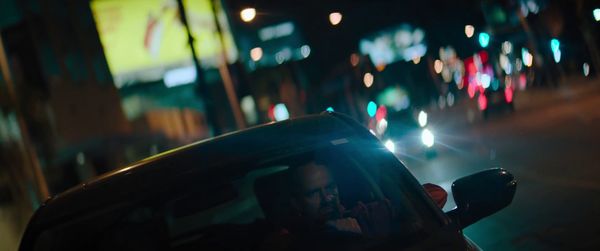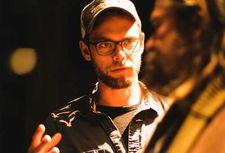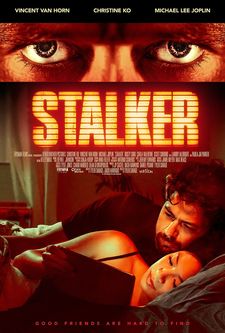 |
| Michael Lee Joplin driving through the night in Stalker |
The story of Andy (Vincent Van Horn), a newcomer to Los Angeles who finds himself stalked by ride share driver Roger (Michael Lee Joplin), Tyler’s Savage’s Stalker was a popular contribution to last year’s Frightfest line-up, where it screened under the title Blinders. Tyler, who explains that Stalker was actually the name used during shooting, says that they reverted to it on the recommendation of the distributor. He made the film, three years after enjoying a hit with Inheritance, partly because he was attracted to the idea of collaborating on a project. I asked him how that came about.
 |
| Tyler Savage |
“Michael and Vincent were close friends,” he explains.” And so between those relationships with them and then also my writing partner, Dash Hawkins, who I work a lot with, from the beginning, before anything was written, we just kind of knew we wanted to do something together. And I'd been looking for something to do with those two actors because they were really fun to work with together, and they have a lot of trust for each other.
"So yeah, it came from a kernel of an idea about a thriller set around the ride share set-up, and then we wanted to play with some dark comedy and find a blend of dark comedy and tension with the two of them. So I think that was the original inspiration, and then from there, it just kind of got fleshed out.”
So was that something that affected the acting as well, and how he directed them on set?
“Yeah, definitely. We did a fair amount of improv work before we shot and some of that stuff influenced some of the dialogue and the writing, just because everybody's got a natural cadence for the way they speak. Just getting a sense of where the actor comes from, because also all the actors, including Christine [Ko], who was great to work with, they all have different styles. So I think that that's part of the process too, understanding not just the material but but what the actor is comfortable with and what they're going to bring to it, and let that be a dialogue. I'm not very rigid about saying, ‘Oh, the line’s written that way. Therefore, you have to say it exactly.’ That will make it much more what feels right in the moment.”
 |
| Christine Ko as Sam |
So how did Christine (who plays the woman Andy gets involved with in Los Angeles) come into it?
“We had a great casting director, Kelly Knox,” he says. “And, you know, [Christine] was on a couple early lists that we been thinking about, and I think he maybe knew her manager or had worked with her on something. And he was a big fan of hers. And he's like, let me get you guys at a lunch this week. And then she and I hit it off, and she came on board the next day. So it was good. And I think, you know, she saw that role and thought you could have some fun with it, so it was really cool. But, you know, Michael and Vincent come from more of comedy improv, kind of Austin acting scene backgrounds, and she was coming from more TV work and stuff, even multi camera stuff. So it was just a different approach with everybody. But it was a great learning process and I think we all had a lot of fun.”
Without wanting to give too much away, Christine gets to play a fantastic character who has her own story arc and isn’t just a love interest for Andy to worry about. Was that part of what attracted her to the role?
 |
| Sam keeps her eyes open |
“Yes, I mean, honestly, frankly, I don't think she would have taken the role had she not. That was definitely one of the big breakthroughs in the writing process is. How do you do something that, again, is intentionally familiar, it's intentionally a familiar type of set-up in a world that we think we've seen before, and then you try to use that as a way to then do something new, or do something slightly different..? There's a bit of a gender politics kind of commentary going on there. And I think that, you know, that was something that she definitely found appealing. And we worked on it in terms of her dynamics with the other characters and had to let her bring something to it, and humanise her so that that that's a character with a real dynamic.”
The central focus of the story, the stalking, is, sadly, something that a lot of people have experienced, at least to a minor degree. Did they draw on real experiences to develop that plot?
To an extent, says Tyler. “I won't name names, but yeah, there was another friend of mine, who was involved with the project who had an experience with somebody where, you know, it got really unfortunate and, you know, people are really capable of manipulating, and we see it, like you said, even in really minor ways. I've never been you know, in any version that was nearly this dramatic, but I do think that I've been sort of, you know, gas lit or lied to.” He pauses, thinking about it.
 |
| Too close for comfort |
“I was with somebody that was an addict and had been hiding a lot of behaviour behind my back for months. There's different ways of being manipulated, especially now, there's more opportunity for it than ever. A lot of us have some public persona of some kind. There was like a bit of a feeling, I think, in terms of the original idea where I was with a rideshare driver who was just a little too interested in my life. And then when he dropped me at home, it really was creepy. I was like, ‘That guy knows my face, he knows where I live, he, you know, knows a few key details about me from our conversation.’ I think we live in a world where we've all got to be a little conscious of it now.”
There are points in the film which emphasise how easy it is to get hold of people’s personal information these days. Does he think that people might come away from the film being a little bit more cautious about their personal details?
“Yeah. I mean, I think that there's a lot of content out there now about the perils of modern living and all of that, and I do think that there's like a little bit of data commentary in there. But we tried to keep it general enough, because I didn't want it to age poorly. I wanted it to feel a little weirdly timeless, even though technology is part of it. It's more about that kind of existential anxiety of being targeted, as opposed to a specific issue with, you know, personal data or identity theft. You know what I mean? So it was kind of trying to find that balance, but I think we all need to be a little bit more conscious of that.”
 |
| Andy connects with his old life online |
Andy is vulnerable to this in part because he's new in town and he doesn't know anybody to begin with. People often talk about Los Angeles as a very fake kind of place. Is the film commenting on fakeness?
“I love that question,” says Tyler. “Yeah, I'm from Los Angeles, so I have a conflicted relationship with it. I think when I was a teenager, in my early 20s, I really hated it. I left. I went to New York, I went to Austin, Texas, I lived out of the state for almost like seven or eight years. And so by the time I came back, I was able to look at it with more of a fresh perspective. And I also moved to a different part of town. So, that is true. I mean, there's a lot of fakeness in LA. I mean, I think there is everywhere, certainly not just here, but then you do have a lot of people coming here, whether they're a performer or they're pursuing some sort of dream, you know, there's a lot of turnover in LA. And that's why it felt like a very natural setting for this movie. Not just because like, ‘Hey, we're in LA, we can make a movie in LA – I actually think that it was the right setting for the themes of the film.”
And then there’s the Los Angeles sunshine and that bright daylight horror thing. Was that fun to play with from a genre perspective?
 |
| California dreaming |
“Definitely,” he says with a grin. “I mean, I love the juxtaposition. The comedy versus the horror and the sunshine versus the gloomy, more Taxi Driver kind of, you know, neon lights and those sorts of things. And we actually shot all the daytime stuff in the movie with a gold filter on it because we just wanted it to look like golden Southern California, and then to make the nighttime really just feel like ‘Oh, the world is dangerous,’ kind of thing.”
There's a certain kind of horror in it as well that’s different from the usual genre stuff in that it's incredibly socially awkward. I always found that a lot harder to watch than gore. Is that something that Tyler finds challenging?
“Totally,” he says. “I love that you said that. I think that is the core of day to day life, especially now that we're coming back from Covid and we're having to remember how to be social again. I've definitely been in some painfully awkward situations just because it's almost like you're getting your training wheels back on. You're like, ‘Wait, how do I have a conversation with somebody I don't know?’
 |
| Stalker poster |
"So yeah, I mean, I think that was part of it. And that was really part of why, especially with Michael Joplin, you know, I really wanted him to be there to put them on the spot. He has this presence about him, where he can be so present and he will never stop, you know, never break eye contact. He will be really there with you. And I was like, if we could just turn that up to 11, this will be unbearable. I think it's great, too, because there's some humour in it, but there's obviously tension in it. And then it's also relatable. So if those moments work for people, you obviously don't want to live in that discomfort for too long. But I think some of those moments, you know, make the movie more relatable.”
They add a bit of ambiguity to Andy's character as well, I suggest, because there are times when he does seem to be behaving unreasonably towards Roger.
“Yeah, and again, there’s the idea of doing something where it is a traditional thriller so you're watching and being like, ‘I get it. I know this dynamic. I've seen this type of dynamic,’ but then let Andy actually have some part of his character that you weren't anticipating, rather than just being a victim. So that there's this world of manipulation and lies and he is a reflection on that in certain ways, too.”
He’s now looking for the right dark comedy thriller to pursue next, he says.
“I've got two things up in the air right now, one of one of which is sort of a similar guy versus guy dynamic in terms of the central relationship but it's playing off that romcom in-laws thing. I'm just trying to figure out what makes sense. Dash and I are writing that one together. And then I'm writing a couple things solo, and then also, you know, I'm hopefully directing work off of this, even if it wasn't something I wrote. So I'm just trying to see what opportunities might might come from this.”
Stalker is available on VoD from this Friday, 21 May.





















